GUANTANAMO BAY, CUBA — Abd al-Rahim al-Nashiri was tortured by the United States of America. His lawyers say so. The U.S. government has said so. But whether or not members of the press and the public could hear him testify about his torture — from an adjacent room through three panes of glass — and listen — on a 45-second delay — was a matter of debate at Guantanamo Bay’s Camp Justice facility on Wednesday.
Al-Nashiri — the man the government alleges planned the attack on the USS Cole that killed 17 sailors and injured dozens in October 2000 — walked into a white-walled courtroom surrounded by several layers of barbed wire fences for the first day of pre-trial hearings on the legitimacy and logistics of his military commission trial. The administration announced they would restart military commissions last March, and al-Nashiri’s case could be the first to head to trial later this year.
The biggest open question ahead of Wednesday’s session was whether al-Nashiri — clean shaven and wearing all white — would get to testify about his torture in court, and whether that testimony could be made public. The answer? Not today.
Judge Col. James L. Pohl avoiding ruling on the question of whether al-Nashiri would testify, instead making his testimony moot by ruling on behalf of his lawyer’s request to leave him unshackled when they meet with their client.
The question of shackling is key because the 47-year-old Saudi’s defense attorneys say it reminds him of how he was constrained when being held in a CIA “black site.”
As recounted in a 2004 CIA Inspector General report, a debriefer “entered the cell where Al-Nashiri sat shackled and racked the handgun once or twice close to Al-Nashiri’s head” and “entered the detainee’s cell and revved the drill while the detainee stood naked and hooded” shortly after al-Nashiri was first taken into custody in 2002. Al-Nashiri was transferred from an overseas CIA “black site” to the Guantanamo Bay facility in 2006.
Lawyers for al-Nashiri wrote in a motion last month that they anticipated that it might be “necessary and appropriate for the accused to show counsel how events occurred.” They said they might take a “psychodramatic approach” to the testimony that would allow lawyers to “access the experiences of others — to see things as they saw them and to feel it as they felt it — in other words, to truly empathize.”
The prospect of testimony from al-Nashiri — and the likelihood that such a hearing would be conducted in a closed session — is what led 10 media companies to send First Amendment lawyer David Schultz down to Guantanamo to argue for the court to be open during the testimony.
This was Schultz’s first trip to Guantanamo and his testimony marked the first known time that a military commission has heard an argument from a non-party.
“We did establish an important precedent — that the pubic and the press have the right to be heard,” Schultz told TPM after the hearing.
Schultz mentioned publicly available information about the government’s treatment of al-Nashiri in court — the use of waterboarding, a drill and a gun — and said it would be “impossible” to reach a conclusion that national security concerns should prevent the public from hearing “information that the whole world knows or can find in two seconds on the Internet.”
“You’re always going to have some people who think this thing is a sham,” Schultz told TPM. “But the general public can only have confidence in the judgments if the system itself is open.”
The legitimacy of the forum itself was the subject of a separate series of arguments by al-Nashiri lawyer Michel Paradis.
“The intent and purpose of the Military Commissions Act was to deny equal justice,” Paradis argued. He argued that the system of justice an individual is placed into — military or civilian — should not be decided “simply by accident of where they were born” and that Congress set up the military tribunal system for “political self interest and political self interest alone.”
“Separate is not equal. We do not segregate in the United States anymore, we fought long and hard for that,” Paradis said. At one point, he argued that decisions about trying defendants in either military or civilian court would “at a certain point” become “outright forum shopping.”
The prosecution argued that Congress had a “very rational and legitimate reason” for setting up two judicial systems.
Judge Pohl seemed inclined to defer to previous decisions about the legitimacy of military tribunals made by higher courts. But Paradisl argued that the fact that the death penalty was in play in this case made it different from previous decisions.
Preliminary hearings in the al-Nashiri case continue on Thursday, though it’s not clear if al-Nashiri will be in attendance.
Defense lawyers asked the judge to order that Guantanamo officials don’t forcibly extract al-Nashiri from his cell if he indicates he doesn’t wish to attend.






